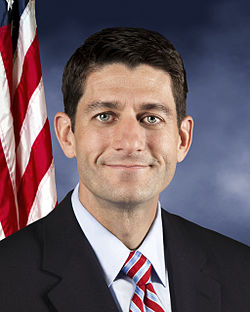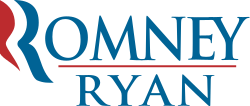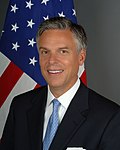2012 United States presidential election
57th quadrennial U.S. presidential election From Wikipedia, the free encyclopedia
Remove ads
The 2012 United States presidential election happened on November 6, 2012. Barack Obama, the incumbent president and Democratic candidate, won the election. He defeated Mitt Romney, the Republican candidate, who was the former Governor of Massachusetts. There were also elections for the U.S. Senate and U.S. House of Representatives.
Wikimedia Commons has media related to United States presidential election, 2012.
By November 6, 2012, 11:30 PM ET (5:30 AM UTC), many broadcast networks said that Obama and Biden won the election. Mitt Romney of the Republican Party conceded the election to Obama around 1 AM ET on November 7. Gary Johnson of the Libertarian Party came in third.
Remove ads
Electoral College changes
Between the 2008 and 2012 elections the Electoral College changed because of the 2010 Census. As a result, several states have lost electoral votes, and several states have gained electoral votes. Here are the states that have gained or lost electoral votes:
Remove ads
Conventions
The Republicans held their national convention from August 27 to August 30, 2012 at the St. Pete Times Forum in Tampa, Florida.[2] The Democrats held their convention from September 3 to September 6, 2012 at the Time Warner Cable Arena in Charlotte, North Carolina.[3]
Major candidates
Democrats
Barack Obama declared that he was running for re-election in 2012 on April 4, 2011. He had challengers in 7 states, but still managed to win all 57 democratic primaries and therefore the democratic nomination.
Nominees
Other candidates
- John Wolfe, Jr., attorney from Tennessee
- Darcy Richardson, historian from Florida
- Bob Ely, entrepreneur from Illinois
- Randall Terry, anti-abortion activist from West Virginia
Republicans
Nominees
Withdrawn
- Ron Paul, U.S. Representative from Texas (ended active campaigning on May 14, 2012; no endorsement, continued to seek delegates from earlier primaries).[6]
- Fred Karger, Political consultant and gay rights activist from California (withdrew June 29, 2012).[7]
- Newt Gingrich, former U.S. Speaker of the House of Representatives from Georgia[8][9] (withdrew on May 2, 2012, and endorsed Mitt Romney)[10]
- Rick Santorum, former senator from Pennsylvania (withdrew on April 10, 2012, and endorsed Mitt Romney)[11][12][13]
- Buddy Roemer, former governor of Louisiana[14][15] (withdrew on February 22, 2012, to run for the nominations of Americans Elect and the Reform Party, then endorsed Gary Johnson)
- Rick Perry, Governor of Texas (withdrew on January 19, 2012, and endorsed Newt Gingrich, then Mitt Romney after Gingrich withdrew)[16][17][18]
- Jon Huntsman, former U.S. ambassador to China and former governor of Utah (withdrew on January 16, 2012, and endorsed Mitt Romney)[19][20]
- Michele Bachmann, U.S. Representative from Minnesota (withdrew on January 4, 2012, and endorsed Mitt Romney)[21][22][23]
- Gary Johnson, former governor of New Mexico (withdrew on December 28, 2011, to run for the nomination of the Libertarian Party)[24][25]
- Herman Cain, a businessman from Georgia (withdrew on December 3, 2011, and endorsed Newt Gingrich, then Mitt Romney after Gingrich withdrew)[26][27]
- Thaddeus McCotter, U.S. Representative from Michigan (withdrew on September 22, 2011, and endorsed Mitt Romney)[28][29]
- Tim Pawlenty, former governor of Minnesota (withdrew on August 14, 2011, and endorsed Mitt Romney)[30][31]
In the middle of 2011, there were many Republicans running: Minnesota congresswoman Michelle Bachmann, Businessman Herman Cain, Speaker of the House of Representatives (in the 1990s) Newt Gingrich, Texas Congressman Ron Paul, Ambassador to China and Governor of Utah Jon Huntsman, Texas Governor Rick Perry, Former Massachusetts Governor Mitt Romney, former Pennsylvania Senator Rick Santorum, Former New Mexico Governor Gary Johnson, Buddy Roemer, Thaddeus McCotter, and Former Minnesota Governor Tim Pawlenty.
Scott Brown, Sarah Palin, Chris Christie, Donald Trump, Mike Huckabee, and Rudy Giuliani were considered possible candidates. All of them said that they were not going to run for president.
In May, a series of debates began between the Republicans. In August 2011, the Ames Straw Poll was conducted. It was won by Bachmann, with Paul coming in second. During the poll, Perry entered the race. After not placing in the top 2 in the poll, former Minnesota governor Tim Pawlenty dropped out. Thaddeus McCotter dropped out a short time later.
Rick Perry became the frontrunner (person with the highest amount of support who is expected to win, according to polls) of the party, ahead of Romney in the polls. Rick Perry then had several bad debates and in one of them, he said he wanted to remove 3 government departments, but forgot one of them. After these mistakes, Perry's poll numbers went down.
In the fall, Herman Cain became the new frontrunner for several months. He had an economic plan called 9-9-9 that would replace the entire tax system with a 9% income tax, a 9% national sales tax, and a 9% corporation tax. During foreign policy debates, he was not as successful. On December 3, 2011, Cain left the Presidential race. This was after several women said that he had sexually harassed them.
Newt Gingrich and Mitt Romney were the two main competitors after that, but soon after Newt Gingrich lost much of his support. Gary Johnson withdrew on December 28, 2011, to run for the nomination of the Libertarian Party.
In January 2012, after not doing well in the primaries, Bachmann, Huntsman, and Perry dropped out of the Presidential race. Rick Santorum, however, picked up a surprise win in Iowa, as did Gingrich in South Carolina.
For February, March, and the beginning of April, Rick Santorum was Mitt Romney's main competitor. On April 10, However, with only 11 (primary) victories to Romney's 23, Rick Santorum announced that he was going to drop out of the race. Buddy Roemer dropped out on February 22nd to run for the nominations of americans elect and the reform party, before ending his campaign completely on May 31.
After Santorum dropped out, most people thought that Mitt Romney would win the most primaries, and therefore the most pledged delegates, and ultimately the nomination. His two remaining opponents, Newt Gingrich and Ron Paul decided to stay in the race. Gingrich dropped out on May 2 after a disappointing showing in the Delaware primary that left his number of victories at 2 to Romney's 28. Paul, despite having only 1 victory to Romney's eventual 42 victories, did not end his campaign until after the 2012 republican national convention.
Santorum and Gingrich released their delegates ahead of the convention to vote for Romney.
At the republican national convention, with support from many pledged and unpledged delegates, Romney won the nomination in a landslide. The convention chose Paul Ryan as Romney's running mate.
Others
Other candidates for nomination included Virgil Goode, Roseanne Barr, Rocky Anderson, and Tom Hoefling.
Four other parties nominated candidates that had ballot access or write-in access to at least 270 electoral votes, the minimum number of votes needed in the 2012 election to win the presidency through a majority of the electoral college.
Libertarian Party
- Gary Johnson, former governor of New Mexico.[32] Vice-presidential nominee: Jim Gray, retired state court judge, from California[33]
Green Party
- Jill Stein, medical doctor from Massachusetts.[34][35] Vice-presidential nominee: Cheri Honkala, social organizer, from Pennsylvania.[36]
Constitution Party
- Virgil Goode, former U.S. congressman, from Virginia.[37] Vice-presidential nominee: Jim Clymer from Pennsylvania[38]
Justice Party
- Rocky Anderson, former mayor of Salt Lake City and founding member of the Justice Party, from Utah. Vice-presidential nominee: Luis J. Rodriguez from California.[39][40]
Candidates gallery
Remove ads
Polls
Many polls have been taken about the presidential election. Most polls show Obama beating Romney, aside from polls taken between the first and second presidential debates. In polls taken state-by-state, Obama usually wins states he won in 2008, and Republicans usually win states that McCain won in 2008. Indiana, North Carolina, and Nebraska's second congressional district are the main exceptions to the rule.
Remove ads
Results by state
Popular vote count is preliminary, and does not include all precincts.[41]
Projection by state
When you read "Consensus", it means that many news programs have said they believe Obama/Romney will win a particular state. A projection is when someone expresses their belief in something, in this case about the outcome of the election. An EV is an Electoral vote, from the Electoral college.

- Alabama – 9 EVs, Romney (Consensus projection)
- Arkansas – 6 EVs, Romney (Consensus projection)
- Arizona – 11 EVs, Romney (CNN projection)
- California – 55 EVs, Obama (CNN projection)
- Connecticut – 7 EVs, Obama (Consensus projection)
- Colorado – 9 EVs, Obama (AP projection)
- Delaware – 3 EVs, Obama (Consensus projection)
- Florida - 29 EVs, Obama (Consensus projection)
- Georgia – 16 EVs, Romney (Consensus projection)
- Hawaii – 4 EVs, Obama (CNN projection)
- Idaho – 4 EVs, Romney (Consensus projection)
- Illinois – 20 EVs, Obama (Consensus projection)
- Indiana – 11 EVs, Romney (Consensus projection)
- Iowa – 6 EVs, Obama (CNN projection)
- Kansas – 6 EVs, Romney (Consensus projection)
- Kentucky – 8 EVs, Romney (Consensus projection)
- Louisiana – 8 EVs, Romney (Consensus projection)
- Maine – 4 EVs, Obama (Consensus projection)
- Maryland – 10 EVs, Obama (Consensus projection)
- Massachusetts – 11 EVs, Obama (Consensus projection)
- Michigan – 16 EVs, Obama (Consensus projection)
- Minnesota – 10 EVs, Obama (CBS projection)
- Mississippi – 6 EVs, Romney (Consensus projection)
- Missouri – 10 EVs, Romney (CBS projection)
- Montana – 3 EVs, Romney (Consensus projection)
- Nebraska – 3 EVs, Romney (Consensus projection) (4th and 5th Electoral votes Consensus projection)
- Nevada – 6 EVs, Obama (ABC projection)
- New Hampshire – 4 EVs, Obama (Consensus projection)
- New Jersey – 14 EVs, Obama (Consensus projection)
- New Mexico – 5 EVs, Obama (NBC projection)
- New York – 29 EVs, Obama (Consensus projection)
- North Carolina – 15 EVs, Romney (CNN projection)
- North Dakota – 3 EVs, Romney (Consensus projection)
- Ohio - 18 EVs, Obama (CNN projection)
- Oklahoma – 7 EVs, Romney (Consensus projection)
- Oregon – 7 EVs, Obama (CNN projection)
- Pennsylvania – 20 EVs, Obama (Consensus projection)
- Rhode Island – 4 EVs, Obama (Consensus projection)
- South Carolina – 9 EVs, Romney (Consensus projection)
- South Dakota – 3 EVs, Romney (Consensus projection)
- Tennessee – 11 EVs, Romney (Consensus projection)
- Texas – 38 EVs, Romney (Consensus projection)
- Utah – 6 EVs, Romney (CNN projection)
- Vermont – 3 EVs, Obama (Consensus projection)
- Virginia – 13 EVs, Obama (CNN projection)
- Washington, D.C. – 3 EVs, Obama (Consensus projection)
- Washington – 12 EVs, Obama (CNN projection)
- West Virginia – 5 EVs, Romney (Consensus projection)
- Wisconsin – 10 EVs, Obama (Consensus projection)
- Wyoming – 3 EVs, Romney (Consensus projection)
Note: Florida was not called until November 10 due to an extremely close race.
Remove ads
References
Wikiwand - on
Seamless Wikipedia browsing. On steroids.
Remove ads




























